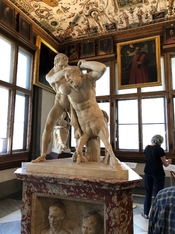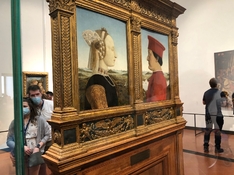My full quote is: "..
.the information about me being in that place belongs to me and I should control whether or not I want to make it public, and to whom I want to make it public."
You are partially right. The information
recorded on the film belongs to the photographer, but the information about me being where I am, doing what I was doing, being with who I was, etc., belongs to me.
The two are not the same. That's because image and context are not the same. Or rather, the photographic image creates new contexts that may or may not have anything to do with the actual context of what was captured.
We all know this: photography puts on a single plane a three dimensional scene. In doing so, it creates new relationships between people, objects, etc — most famous and oft quoted example of this being Friedlander's cloud on a street sign (Knoxville, Tennessee, 1971). These relationships are further manipulated by the photographer: shallow depth of field isolates, different lenses make things closer or further than they actually are, angle of capture creates or breaks relationships. Relationships created can also add symbolic meaning — like the American flag in Frank's The American, or rather how Frank photographs it.
On a photograph, I'm sitting on a bench, in a park, next to a woman, my head slightly turn toward her, my mouth slightly opened. Do I know her? Am I talking to her? Our hands seem close, are they touching? Is the guy behind us close or far? Do we know each other? How many people are there in the park? Why are we there?
This is all context, and depending on where the photographer is, what lens he is using, what depth of field he is using, what he decides to put in the frame (as the saying goes, a photograph is as much about what's in it than what's not in it), with all this, he can give different answers—or rather, suggest different possibilities of answers—to these questions.
We know this, it's street photography 101. Great street photography create relationships, play with context, or rather, the ambiguity of context. One of the greatest photographer working with all these possibilities is Garry Winogrand, who keeps suggesting relationships, brilliantly plays with the ambiguity of context, and adds a fantastic physicality to it all (his 1964 World's Fair photograph is a masterpiece, and a masterclass about this). This is what he meant by his famous quote: "
How do you make a photograph that's more interesting than what happened? That's really the problem," and also why he compared street photography to a very physical sport in which you have to keep moving very fast in order to capture what you want the way you want it.
To sum up (sorry about the long post), "
what happened" is the full context of why I'm sitting on that bench. That belongs to me. That's my privacy ; "
what's more interesting" is your photograph of me. If it all stays between you and me, it's all fine, even if I don't know you took the picture. Problem arises from the fact that photos are made to be looked at, and people looking at it are free to make their own context from the contextual ambiguity and new relationships created or suggested by the photographers. There is a clash, a distorsion between the two narrative that comes from the very nature of photography, and that's why the right to privacy goes way beyond just "you're not allowed to take my picture," and also the reason why, if there is a "right to privacy" written down in may law books, nowhere in the world is there a "right to photograph."
And just to be clear. I'm not at all saying that one shouldn't do street photography or always ask for consent — I love great street photography and cherish the books I have by Winogrand, Frank and the other great street photographers precisely because the create ambiguity by creating new relationships which create new narratives which creates new realities, and that's what is so fantastic about street photography well done: it makes us see the world differently. I'm just saying one should be aware of what one is doing when taking a photograph.
Again, sorry about the long post, a bit off subject from the original post specifically about photographing children.
Garry Winogrand
World’s Fair, New York City
1964










